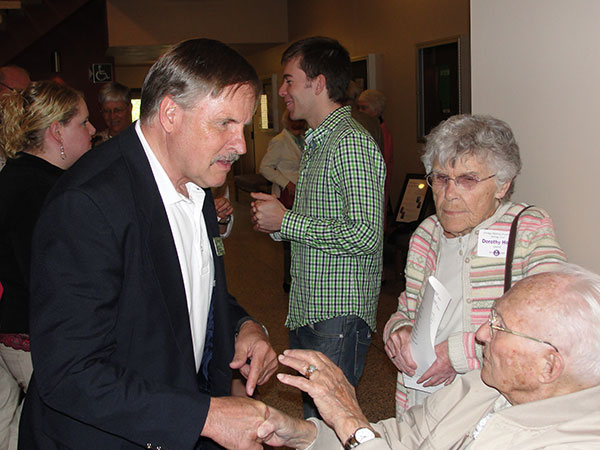By Shari Kiple
For many of Winona State University’s 400-plus retirees, their years as employees may have ended, but their service to the institution is far from over. The WSU Retiree Center is re- engaging former employees in exciting new ways.
“Sometimes there’s a mistaken assumption that when people retire, they don’t do anything,” says Ann Kohner, director of the Retiree Center since August 2011. “The truth is, most of our retirees are very active and they enjoy being involved. They are not sitting back in their rocking chairs. They’re out there.”
The Retiree Center is plugging them in and sending them out. Retirees serve as tutors, mentors, advisors, university committee members, guest lecturers, fundraisers, adjunct professors, thesis advisors, support staff for athletic teams, ushers, travel guides, and more.
“I’m requesting volunteers all the time,” Kohner shares. “They help with a variety of campus events, including student move-in day, Grandparents University, commencement, and countless others.” The Retiree Center offers dozens of opportunities each year ranging from one-time commitments to longer-term committee work.
“As part of the Center’s Assessment Committee, I’m so impressed with the extent to which retirees give back to the community,” says Ron Stevens, longtime WSU faculty member. In recent years, members have contributed about 1,800 hours of service annually.
GETTING STARTED
Indeed, things have unfolded just as Stevens – also one of the Retiree Center’s co-founders – had hoped.
After 36 years as a sociology professor at Winona State, Stevens took early retirement in 2004. As luck would have it, friend and colleague Jim Reynolds also retired that year.
“I was perfectly happy doing what I was doing,” he says, “and I knew I didn’t want to walk away from the university.” So when Reynolds suggested creating a center for retirees on campus it was a no-brainer to the two sociologists. “It was a great way to maintain ties with WSU retirees and consider the many ways they could stay connected to Winona State.”
Following a feasibility study, focus groups, and visits to assess similar programs in other parts of the country, Stevens and Reynolds established a solid rationale for creating a Retiree Center on campus. With the support of then- President Darrell Krueger and WSU’s Office of University Advancement, the Retiree Center was approved in 2004 and hired its first director, Cathie Logan, in 2005.
The goals of the Center encompass educational, social, and service opportunities, which it fulfills through creative programming and community outreach.
For example, while the Retiree Center is managed and funded by the university, its programs are open to all retirees, not just those from Winona State. Its Senior University serves more than 200 people, half of whom are not WSU retirees. Grandparents University welcomes grandparents and their grandchildren (or other seniors with special children in their lives) for a two-day residential college and the chance to learn about a topic together, drawing attendees from throughout the region.
GIVING BACK
“The Retiree Center is a wonderful way to give back to an institution – and a community – that was really good to me,” says Jean Leicester, an education professor at Winona State for 15 years before retiring in 2006. “I’m interested in reaching out to the community through things like Grandparents University and in other ways.”
While she says she’s a “newbie” on the Retiree Center’s Advisory Board, Leicester is seasoned in work that involves service. Her teaching background has been instrumental in leading efforts at the Kumasi School in Ghana where her team, a partnership between Winona State, Mayo Clinic, and Rochester Public Schools, equips K-12 teachers with tools to make science education come to life.
“Mayo Clinic has contributed materials to help create a science room with the resources they need to study malaria,” Leicester explains. This summer, twelve students from Kumasi School visited Winona State to continue their experiments and share results with the public.
“We are also working with the Indian government to identify partner schools to provide resources to help teachers educate students about the importance of clean drinking water,” says Leicester. She adds that her team also works with schools in Rochester to provide internships for teachers, who conduct research in Mayo’s science labs.
Closer to home, Leicester is reaching out through the “Comfort Choir” she started using the model of a hospice choir she had belonged to in the Twin Cities.
“It provides opportunities to get community members singing and offer the gift of voices to those who are facing end-of-life issues or other situations in their lives,” notes Leicester.
“We’ve sung at people’s bedsides or after they’ve received a tough diagnosis,” she says. “We’re all volunteers and go where we’re called.”
And while serving the greater good is always the first priority, it’s particularly nice when service aligns with individual passions. Stevens has devoted significant blocks of time to the area’s Frozen River Film Festival each winter and Great River Shakespeare Festival programs on WSU’s campus each summer, allowing him to screen films, visit with actors, and work behind the scenes in countless ways.
“I’m always interested in broadening the reach of the university,” Stevens says. “Events like these bring people on to campus – often for the first time.”
The volunteer veteran also advises a number of Winona State’s undecided majors. “This is the perfect way to stay connected with WSU students and programs, plus it’s a service that’s needed, greatly appreciated by students, and enjoyable to me. It’s a win-win-win.”
GOING FORWARD
Creating mutually beneficial situations is Kohner’s greatest aim. “We’re constantly thinking of new ways to keep our retirees connected through education, service, and social outreach,” says Kohner, who worked in WSU’s Office of University Advancement for more than a decade before taking on her current role at the Center.
“We have so many retirees who do so much within the university, within the community, and really all over the world,” she says. “In terms of time and monetary equivalences,” adds Stevens, “retirees do things for the university that are far beyond what most people probably realize. They’re giving back in countless ways! If you think about how much their time is worth, it’s considerable.”
But the truth is, most retirees believe they gain as much as they give. “So often,” Leicester says of her efforts, “It’s hard to know who gets the most benefit.”



